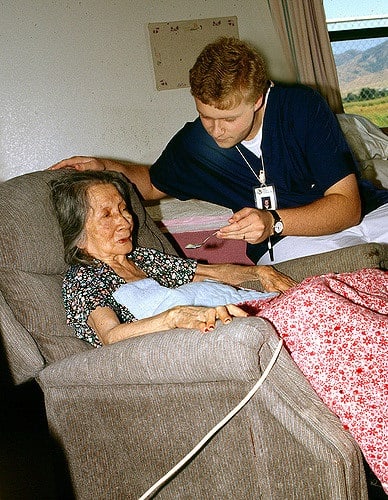Working as a live-in carer is a very rewarding role with high levels of job satisfaction. It may not be the first job that springs to mind when you embark on your career in the caring profession but it has many advantages both personally and professionally over the more typical care roles on residential care homes and nursing homes.
For a start the people that are being cared for overwhelmingly want to stay in their own homes if they can when they become old and frail so you are already helping someone achieve this aim. According to the Better At Home report from the Live-in Care Hub, 99% of people say that live-in care helps them continue to live a happy and fulfilling life even with illness and frailty.
However, the role of a carer of any kind requires certain personal traits, skills and attitudes that not everyone possesses. Of course, you have to be compassionate and empathetic but you also need a good dose of common-sense and practical skills such as cooking tasty, home-cooked meals. You also have to effectively take on the role of companion as well as carer, which might mean taking you elderly client on trips to the shops, library, doctors or community clubs – it is a job that requires true dedication but which, in return, is truly rewarding. A live-in carer can make such a significant difference to how an old person can live their life in their golden years.
What Skills and Personal Qualities Are Required To Be A Live-in Carer?
Experience of some sort in the health sector is always valuable but not a necessity as most live-in care agencies and providers do offer training when necessary. Live-in carers come from all walks of life – they may be nurses, care workers previously based in a residential or nursing home; equally they may have cared for their own elderly relatives before and decide it is a role they would like to take further.
Some are young students from abroad who find they can combine caring for someone else with their studies – often enabling them to live in pleasant areas in cities and towns they would have struggled to afford if they had to pay rent. This can be a perfect way to gain valuable experience in the caring profession whilst also studying for relevant qualifications so they can avoid the problem suffered by so many newly qualified young adults who have qualifications but no experience so find it hard to secure a good job.
Whatever walk of life a live-in or in-home carer comes from they the most important quaoties they can possess are:
- Compassion
- Dedication
- A positive outlook
- Willingness to work hard
- Common-sense
They also need to be physically fit and be able to work happily on their own.
What About Ongoing Support?
Of course, training in such an important role is essential but so too is ongoing support while working in the job, and also continuing professional development to help you develop in your career. Live-in care agencies and providers have a duty of care to their client which means they will always help the carer deal with any difficult situations and where there are complex care needs they will provide support, for instance in the form of an additional carer with specialist skills for medical conditions such as dementia or Parkinsons disease.
All in all a job as a live-in carer is extremely rewarding, you will receive training and gain recognised qualifications, as well as ongoing support to develop your career as a carer to its fullest extent.




